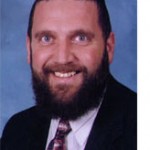By Rabbi Baruch Lederman

SAN DIEGO — This year, the first night of Chanukah is Wednesday December 1, 2010, at which time we will light one Chanukah light plus the shamash. The second night we light 2 lights plus a shamash. The third night we light 3 lights plus a shamash, and so on and so forth.
The shamash is lit, the blessings are recited, then the Chanukah lights are lit. On the first night, we recite all three of the following blessings, on the other nights we recite only the
first two:
(a) Baruch ata ado-noi E-lokainu melech ha’olam, asher kidishanu bemitzvosav vitzivanu lehadlik ner shel Chanukah.
(b) Baruch ata ado-noi E-lokainu melech ha’olam, sheh’asah nisim la’avosainu bayamim ha’haim bazman hazeh.
(c) Baruch ata ado-noi E-lokainu melech ha’olam, shehechiyanu v’kiyimanu v’higiyanu lazman hazeh.
We light the Menorah as soon as possible after 5:12 PM, which is 30 minutes after sunset this year. (All times given are for San Diego, CA, USA.
The light must last for at least 30 minutes or at least till 5:42 PM whichever is later.
On Friday night of Chanukah (Dec 3), we light the Menorah right before we light Shabbos candles (4:24 PM). The Chanukah candles should last till at least 5:42 PM.
On Saturday night (Dec 4) we light Chanukah candles after 5:24 PM, which is 42 minutes after sunset this year. Some light Chanuka candles before making havdala, some light havdala before Chanukah candles; but, neither may be done before 5:24 PM.
The candles in the menorah should be in a straight horizontal line. The shamash may not be in a straight line with the rest of the candles. We place the Menorah in the window and place the candles to our right. We light the newest candle first.
It is customary to eat foods made in oil (latkes, jelly doughnuts), since the miracle occurred with oil. It is customary though not obligatory to eat festive meals on Chanukah.
Guests in a hotel/motel should light in their room.
On all eight days of Chanukah, complete Hallel is recited. Al Hanisim is inserted in shmoneh esrei and bircas hamazon.
Everyone in the family lights their own Menorah, except a married woman whose husband lights for her. Sefardi tradition has just one menorah lit per family.
~
The following thought provoking article was submitted by Menachem “Ricky” Kramer, Far Rockaway, NY:
Israelis totally identify with the Macabees: the few fighting, and being victorious, over the many. This permeates their culture:
Macabbee beer.
Macabi Tel Aviv basketball team.
Macabbean games.
They simply love the Macabees.
The following article is adapted from “Dancing in Time” by Rabbi Y. Y. Rubinstein (Published by Targum Press, Southfield, MI):
An interesting article appeared years ago in a secular Israeli newspaper. The article presented an imaginary conversation between a nonreligious father and his son about Chanukah. The father had just told his little boy the Chanukah story and the child began asking some questions.
“Were the Macabees religious?” asks the son.
The secular father was disturbed by the thought and immediately replied, “No, of course not. They were just like us.”
The little boy said: “But you said they rededicated the Temple!” The father conceded that indeed they had done that.
“So they must have been religious. Otherwise they wouldn`t have bothered!”
The father became a bit uncomfortable. “Well, perhaps they were a bit religious.”
“Did they keep kosher?” asked the son. The father agreed that they probably kept kosher.
“What about Shabbat?”
The father was quite sure about that. “No, I don`t think that they kept Shabbat” came the reply.
“They must have if they were so religious that they wanted to dedicate the Temple and use only pure olive oil.”
The father frowned and conceded that they must have kept Shabbos, too.
Then the little boy said to his father: “Abba, we don`t keep Shabbat or kashrut. We are not religious. If we had lived then, whose side would we have fought on, the Macabees or the Greeks?”
*
Rabbi Lederman is spiritual leader of Congregation Kehillas Torah in San Diego